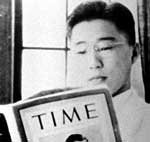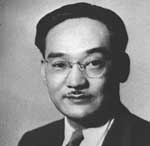|
Three of the earliest resisters to the military draft orders were Gordon Hirabayashi, Min Yasui and Fred Korematsu.
They brought their cases challenging the constitutionality of the curfew, mass removal and the internment before the Supreme Court.
The Constitutionality of the internment were challenged in the courts as early as 1942 in the cases of Hirabayashi v. United States (1943), Yasui v. United States (1943), Korematsu v. United States (1944), and Ex parte Endo (1944). Hirabayashi and Yasui’s convictions for curfew violations were upheld on appeal by the Supreme Court. Korematsu’s conviction for violating exclusion laws was also upheld by the Supreme Court. In 1944, Endo’s challenge to the internment order and won, opening the way for the end of the incarceration.

Gordon Hirabayashi
|
Hirabayashi v. United States.
Gordon Hirabayashi, a second generation Japanese American, born and raised in Washington, was a senior at the University of Washington. Hirabayashi was arrested and convicted on two counts, one for violating General DeWitt's curfew order, and two, for failing to register at a control center to prepare for departure to an "assembly" center.
Yasui v. United States.
Minoru Yasui was an American born citizen of Japanese ancestry, a graduate of the University of Oregon Law School, a U.S. Army reserve officer, an attorney and active member of the Japanese American Citizens League. Yasui challenged the curfew orders on the grounds of racial discrimination. He served nine months in solitary confinement while awaiting trial.

Minoru Yasui
|
Both Hirabayashi and Yasui were tried and convicted for violation of the curfew law. They both appealed their cases to the Supreme Court. In 1944, the Court upheld their convictions, thus declaring that the President and Congress had appropriately used the war power provided in the Constitution.
Korematsu v. United States.
Born and raised in Oakland, California, Fred Korematsu tried to enlist in the Navy, but was denied because of his Japanese ancestry. At the outbreak of World War II, he was dismissed from his job as a welder at a San Leandro shipyard, due to his Japanese ancestry. Korematsu ignored the evacuation orders so that he could be with his fiancee. He was arrested by the FBI and after spending two and a half years in jail, found guilty of violating the evacuation orders and put on five years probation. Korematsu was then taken into custody by the Military Police was sent to sent to an assembly center.
The Supreme Court made its ruling in December 1944, over two years after Japanese Americans were removed from the West Coast and put into detention camps. The Court decided in a 6-3 vote, upholding the exclusion of Japanese Americans from the West Coast regions. The Court's cited reason was the war with Japan and the military necessity perceived by Congress and military leaders.
However, the Court was not unanimous in its decision, and Justices Robert H. Jackson, Frank Murphy, and Owen J. Roberts strongly dissented. Justice Murphy declared that the exclusion orders did violate the rights of citizens to due process of law. While Murphy admitted that the argument citing military necessity held importance, the evidence presented had neither substance nor support. He insisted that the military necessity claim must subject itself to the judicial process "to determine whether the deprivation is reasonably related to a public danger that is so immediate, imminent, and impending."
In handing down the decision on the eviction, the Supreme Court avoided the ruling on the internment.
Ex Parte Endo
In 1942, the California State Highway Commission in Sacramento, California dismissed Mitsuye Endo from her civil service stenographer job and the military ordered her to a detention center. She was a U.S. citizen and had a brother serving in the U.S. Army. Her attorney, James Purcell, filed a writ of habeas corpus on her behalf, contending that the War Relocation Authority had not rights to detain a loyal American citizen who was innocent of the various allegations the Army had used to justify the eviction and incarceration.

Mitsuye Endo
|
On December 18, 1944, the Supreme Court ruled unanimously that Endo "should be given her liberty" and released from custody, since her loyalty was clearly established.
In the ruling, Justice Murphy stated: "…detention in Relocation Centers of persons of Japanese ancestry regardless of loyalty is not only unauthorized y Congress or the Executive, but it is another example of the unconstitutional resort to racism inherent in the entire evacuation program."
Major Pratt, commander of Military Area #1 at the time, ordered the suspension of the exclusion orders; and detained Japanese Americans were now free to return to their homes on the West Coast.
Nevertheless, the rulings made by the Supreme Court left both dangerous and disturbing precedents. Knowing that martial law had not been declared on the West Coast, and all civil courts were open and functioning, the President and military could decide in their judgement, that a national emergency exists, and thus choose to ignore, suspend or deny all rights of its citizens.
See Court Victories section for the startling findings on these Supreme Court cases almost forty years later.
Text excerpted from "Historical Overview," Teachers Guide - The Bill of Rights and the Japanese American World War II Experience, published by the National Japanese American Historical Society and the San Francisco Unified School District. © All rights reserved.
 Military Service Military Service
|
|
|

